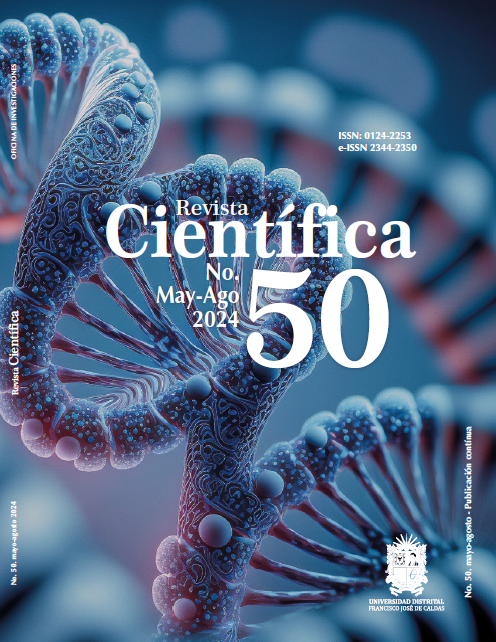DOI:
https://doi.org/10.14483/23448350.22613Published:
08/30/2024Issue:
Vol. 50 No. 2 (2024): May-August 2024Section:
Research ArticlesComparative Analysis of Control Algorithms for Mobile Robots under Noise Conditions
Análisis comparativo de algoritmos de control para robots móviles bajo condiciones de ruido
Keywords:
autonomous robots, control theory, mobile robots (en).Keywords:
robótica móvil, robots autónomos, teoría de control (es).Downloads
Abstract (en)
The control of mobile robots in dynamic environments poses unique challenges compared to traditional manipulators, particularly due to the influence of wheel configuration on robot dynamics. Despite extensive studies on pathfollowing algorithms, the inclusion of noise in simulations is often overlooked, which is critical for real-world applications. To address this gap, this paper provides a comprehensive evaluation of four popular control algorithms under various noise conditions, i.e., proportional-integral control, feedback linearization, Lyapunov-based control (LBC), and model predictive control (MPC). The algorithms were tested using a circular trajectory to ensure consistent and challenging conditions, and their performances were measured using the integral absolute error and mean squared error metrics. The results show that LBC and MPC offer superior robustness to noise, making them suitable for practical applications. This study contributes to the existing literature by highlighting the importance of considering noise in control algorithm evaluations and provides recommendations regarding the selection of appropriate controllers for mobile robots in noisy environments.
Abstract (es)
El control de robots móviles en entornos dinámicos presenta desafíos únicos en comparación con los manipuladores tradicionales, particularmente debido a la influencia de la configuración de las ruedas en la dinámica del robot. A pesar de los numerosos estudios sobre algoritmos de seguimiento de trayectorias, a menudo se pasa por alto la inclusión de ruido en las simulaciones, lo cual es crítico para las aplicaciones del mundo real. Para abordar esta brecha, este documento proporciona una evaluación exhaustiva de cuatro algoritmos de control populares bajo diversas condiciones de ruido, i.e., control proporcional-integral, linealización por retroalimentación, control basado en Lyapunov (LBC) y control predictivo basado en el modelo (MPC). Los algoritmos fueron probados utilizando una trayectoria circular para asegurar condiciones consistentes y desafiantes, y sus desempeños fueron medidos utilizando las métricas de error absoluto integral (IAE) y error cuadrático medio (MSE). Los resultados muestran que el LBC y el MPC ofrecen una robustez superior al ruido, lo que los hace adecuados para aplicaciones prácticas. Este estudio contribuye a la literatura existente al destacar la importancia de considerar el ruido en la evaluación de algoritmos de control, y proporciona recomendaciones respecto a la selección de controladores apropiados para robots móviles en entornos ruidosos.
References
Bakker, T., van Asselt, K., Bontsema, J., Müller, J., van Straten, G. (2010). A path following algorithm for mobile robots. Autonomous Robots, 29(1), 85-97. https://doi.org/10.1007/s10514-010-9182-3
Bascetta, L., Farina, M., Gabrielli, A., Matteucci, M. (2022). A feedback linearisation algorithm for singletrack models with structural stability properties. Control Engineering Practice, 128, e105318. https://doi.org/10.1016/j.conengprac.2022.105318
Chaib, S., Netto, M. S., Mammar, S. (2004). H /sub ∞/ adaptive, PID and fuzzy control: a comparison of controllers for vehicle lane keeping. IEEE Intelligent Vehicles Symposium, 2004, 139-144. https://doi.org/10.1109/IVS.2004.1336370
Guo, H., Cao, D., Chen, H., Sun, Z., Hu, Y. (2019). Model predictive path following control for autonomous cars considering a measurable disturbance: Implementation, testing, and verification. Mechanical Systems and Signal Processing, 118, 41-60. https://doi.org/10.1016/j.ymssp.2018.08.028
Juárez-Lora, A., Rodríguez-Ángeles, A. (2023). Bio-inspired autonomous navigation and formation controller for differential mobile robots. Entropy, 25(4), 582. https://doi.org/10.3390/e25040582
Lu, L., Yin, K.-L., de Lamare, R. C., Zheng, Z., Yu, Y., Yang, X., Chen, B. (2021). A survey on active noise control techniques -- Part I: Linear systems. http://arxiv.org/abs/2110.00531
Maxim, A., Copot, D., Copot, C., Ionescu, C. M. (2019). The 5W’s for control as part of Industry 4.0: Why, what, where, who, and when—A PID and MPC control perspective. Inventions, 4(1), e10. https://doi.org/10.3390/inventions4010010
Meng, J., Liu, A., Yang, Y., Wu, Z., Xu, Q. (2018). Two-wheeled robot platform based on PID control [Conference paper]. 5th International Conference on Information Science and Control Engineering (ICISCE). https://doi.org/10.1109/ICISCE.2018.00208
Muir, P. F., Neuman, C. P. (1987). Kinematic modeling of wheeled mobile robots. Journal of Robotic Systems, 4(2), 281-340. https://doi.org/10.1002/rob.4620040209
Özdemir, M., Öztürk, D. (2017). Comparative performance analysis of optimal PID parameters tuning based on the optics inspired optimization methods for automatic generation control. Energies, 10(12), e2134. https://doi.org/10.3390/en10122134
Paden, B., Cap, M., Yong, S. Z., Yershov, D., Frazzoli, E. (2016). A survey of motion planning and control techniques for self-driving urban vehicles. IEEE Transactions on Intelligent Vehicles, 1(1), 33-55. http://arxiv.org/abs/1604.07446
Rubio, F., Valero, F., Llopis-Albert, C. (2019). A review of mobile robots: Concepts, methods, theoretical framework, and applications. International Journal of Advanced Robotic Systems, 16(2), e9881419839596. https://doi.org/10.1177/1729881419839596
Uddin, N. (2017). Lyapunov-based control system design of two-wheeled robot [Conference paper]. International Conference on Computer, Control, Informatics and Its Applications (IC3INA). https://doi.org/10.1109/IC3INA.2017.8251752
Wang, G., Zhou, C., Yu, Y., Liu, X. (2019). Adaptive sliding mode trajectory tracking control for WMR considering skidding and slipping via extended state observer. Energies, 12(17), e3305. https://doi.org/10.3390/en12173305
Zhai, J., Song, Z. (2019). Adaptive sliding mode trajectory tracking control for wheeled mobile robots. International Journal of Control, 92(10), 2255-2262. https://doi.org/10.1080/00207179.2018.1436194
Zhang, X., Huang, Y., Wang, S., Meng, W., Li, G., Xie, Y. (2021). Motion planning and tracking control of a fourwheel independently driven steered mobile robot with multiple maneuvering modes. Frontiers of Mechanical Engineering, 16(3), 504-527. https://doi.org/10.1007/s11465-020-0626-y
How to Cite
APA
ACM
ACS
ABNT
Chicago
Harvard
IEEE
MLA
Turabian
Vancouver
Download Citation
License
Copyright (c) 2024 Ángel Escobedo, Valery Salas, Oscar Loyola, C´esar Sandoval, Juan Carlos Vidal Rojas

This work is licensed under a Creative Commons Attribution-NonCommercial-ShareAlike 4.0 International License.
When submitting their article to the Scientific Journal, the author(s) certifies that their manuscript has not been, nor will it be, presented or published in any other scientific journal.
Within the editorial policies established for the Scientific Journal, costs are not established at any stage of the editorial process, the submission of articles, the editing, publication and subsequent downloading of the contents is free of charge, since the journal is a non-profit academic publication. profit.



